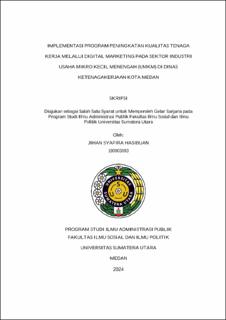Implementasi Program Peningkatan Kualitas Tenaga Kerja melalui Digital Marketing pada Sektor Industri Usaha Mikro Kecil Menengah (UMKM) di Dinas Ketenagakerjaan Kota Medan
Implementation of Workforce Quality Improvement Program Work Through Digital Marketing in The Industrial Sector Micro Small to Medium Enterprises (UMKM) in The Services Medan City Employment

Date
2024Author
Hasibuan, Jihan Syafira
Advisor(s)
Siahaan, Asima Yanty Sylvania
Metadata
Show full item recordAbstract
Improving the quality of the workforce for MSME players can be done by providing digital marketing training which is useful for improving the abilities of MSME players by utilizing the internet and technology in marketing their products online using interesting promotional content. However, problems are still encountered, namely lack of knowledge and lack of understanding of MSME actors in product marketing, lack of supporting facilities such as infrastructure and limited human resources/staff. Therefore, efforts are needed to improve MSME skills in managing digital-based marketing. This research aims to find out and describe in depth the implementation of the Workforce Quality Improvement Program through Digital Marketing in the MSME food industry sector at the Medan City Employment Service.
The research method used in this research is descriptive qualitative. The informants in this research consisted of the Head of Training and Labor Productivity, Head of the Certification Scope Work Team, Instructors/Trainers, and people who took part in digital marketing training. Data collection techniques used were interviews, observation and literature study. Data analysis techniques include data reduction, data presentation and drawing conclusions. This research uses program implementation indicators according to George Edward III (1980), namely communication, resources, attitudes and bureaucratic structure.
The results of the research show that the implementation of the Workforce Quality Improvement Program through Digital Marketing in the MSME Food Industry Sector in the Medan City Manpower Office shows that the program has not been effective as expected, seen from communication between the Medan City Manpower Office and there is still a lack of socialization and interaction in convey information or respond to questions, input provided by the community. In terms of resources, there is still a lack of human resources, such as forming a special team to manage communications, including creating content, responding to questions and input due to limited capabilities. The training process that was taught also seemed rushed. Then from the disposition, after completing the digital marketing training, it is hoped that the Medan City Employment Service should monitor the development of the businesses carried out by digital marketing training participants.
Collections
- Undergraduate Theses [1938]
